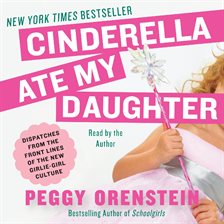

In one particularly fascinating chapter, Orenstein lays out the history of how the idea of “Disney Princesses” as a marketing concept came to be. I found myself chuckling as I read, and devouring the text with much more relish than I usually can devote to non-fiction.īeyond being entertaining, the book is informative and eye-opening, particularly to anyone currently entrenched (as I am) in the daily battle with a young girl over princes purchases. She examines most of these issues through the lens of her own parenting experience, and the discussion reminded me of ones that I’ve had many times with girlfriends. Orenstein covers everything from princesses to pop music to Facebook. But what I did find was a thoughtful – and thought-provoking – exploration of princesses and of girl-focused media in general. Parenting styles are as individual as parents, and we use our unique instincts and values to guide us. I didn’t find answers in the literal sense because, as with everything in parenting, there are no hard rules. I thought, finally, I would find some answers. But, I wondered, what ever would that approach be? When I heard that Peggy Orenstein had written a book about this very issue, I couldn’t wait to read it. (I read once that Barbara Kingsolver had banned all Barbies from her home until she overheard her older daughter tell a friend, “When I grow up, I’m going to have all the Barbies I want.”) So, instead, I decided to develop a mindful and balanced approach to the princess problem. That “no” starts to lose its power when overused, and one risks actually raising the allure of the prohibited item. Win’s response to princesses was instant and intense she was smitten from her first “happily ever after.” Even if I could maintain a strict embargo with land of Disney, it might not be the wisest course. I quickly realized, as many parents have before me, that I could not keep everything princess-related out of her life. I thought I might be off the hook, at least until kindergarten. I stocked up on gender neutral clothes and, for the first several months of her life, Winnie (and I) avoided the issue entirely.


Those few months, I realized, would be the only time when no one would put any expectations or limitations on my child based on gender. I didn’t find out Winnie’s gender while I was pregnant. The emphasis on beauty, the focus on being desired/getting married, the assertion that girls can’t (or wouldn’t want to) do the same things as boys. Well, with princesses and with all that seems to come along with them. Ever since my daughter Winnie was born three years ago, I’ve been struggling with princesses.


 0 kommentar(er)
0 kommentar(er)
